|
As delegations from around the country are about to come together in Orlando for the Convocation of Catholic Leaders, the Bishops of the United States invite all the baptized to examine the challenges that exist and realistically and joyfully move forth as missionary disciples of Jesus Christ. The Bishops remind us in Living as Missionary Disciples: A Resource for Evangelization that "we become missionary disciples when we take our encounter with Jesus Christ out into the world" (LMD, 17).
The way that we go forth will differ, but each of the baptized is sent from the community of faith to accompany our brothers and sisters, especially those who are on the "peripheries." Pope Francis reminds us that "each Christian and every community must discern the path that the Lord points out, but all of us are asked to obey his call to go forth from our own comfort zone in order to reach all the 'peripheries' in need of the light of the Gospel" (EG, 20). This discernment is exactly what the Bishops of the United States are asking all the baptized to do and is one of the main reasons for the Convocation of Catholic Leaders. "Living as Missionary Disciples: A Resource for Evangelization serves as a road map for leaders and provides principles of evangelization and missionary discipleship, with resources designed for pastoral leaders to develop, enhance, and review their own local strategies to create an evangelizing parish" (LMD, 3). Please pray for all those who participate in the Convocation of Catholic Leaders and may we all recognize and live our call to be missionary disciples of Jesus Christ. May the charity of Christ urge us on!
0 Comments
Peter and Paul are often depicted together in iconography in a circle, embracing one another in a brotherly hug with expressions of affection. In contrast, images of Romulus and Remus, the mythological twins, are usually facing away from each other. According to legend, Romulus and Remus, after whom the city of Rome was named, were abandoned at birth and cast into the Tiber River. When they grew up, the twins embarked on a quest to found their own city. Romulus and Remus disagreed about which hill to build their city on. Eventually, Romulus just started digging a ditch around the Palatine Hill and building a wall. Remus mocked his brother’s work, and in a fit of anger Romulus killed him; Rome and her empire were founded on fratricide. Now contrast this with the re-founding of Rome through the spread of Christianity by Sts. Peter and Paul. If anyone had a cause for strife and division, it was these two. Paul was the chief persecutor of the early Christians led by Peter. These two, at first, had little in common. It took divine action to make these enemies into brothers. Peter and Paul were ultimately bound together in a bond stronger than blood: the love of Christ. It is in this love that Peter and Paul had the foundation of their relationship. Through Christ, these two men were closer than twins in the womb. That’s something I don’t think we fully understand today. Media often portrays the family as the highest and most deserving of our love and loyalty, but there is One who has a higher claim on us. Jesus says, “Whoever loves father or mother more than me is not worthy of me, and whoever loves son or daughter more than me is not worthy of me; and whoever does not take up his cross and follow after me is not worthy of me.”[1] God must come first in our lives, as he did for Peter and Paul. All of our relationships need to take their cue from this one. It isn’t that these natural, human relationships are bad; quite the contrary, they are good. But they are called to be ordered and rooted in the love of Christ. For Peter and Paul, Jesus of Nazareth was the source of their relationship. Peter knew Jesus and walked with him for three years before Christ entrusted him with his flock. Paul, formerly Saul of Tarsus, persecuted Christ by persecuting his followers until Jesus appeared to him on the way to Damascus. Peter and Paul eventually met and talked about the workings of God in their lives and in their ministry. That doesn’t mean they always got along perfectly. In what is known as the “Incident in Antioch,” Paul calls Peter out on the issue of whether or not Gentile converts have to first become Jews and follow Jewish laws in order to be “real” Christians. Peter had previously stated that the Gentiles had no need to follow Jewish custom, and that the new covenant was open to all. However, under pressure from Jerusalem, Peter went back on his word. He traveled to Antioch, where Paul was, and Paul “opposed him to his face because he clearly was wrong.” One can almost hear the exasperation in Paul’s voice as he writes of the incident. But along with the exasperation, one can hear love. Paul is not calling Peter out for the sake of pointing out his spiritual brother’s mistake, but for the sake of the Church and Christ, whom they both love and preach. Peter accepted Paul’s rebuke. In fact, it gave Peter courage to stand up to the Judaizers, those who wanted the Gentiles to practice Jewish customs. Paul always accepted and sought out Peter’s authority as head of the Church, but it didn’t stop him from encouraging his brother to remember the truth and to care for the souls entrusted to him. Peter and Paul remind us that brothers can be born from unlikely sources. Early Christian tradition tells us they were imprisoned together for nine months before their martyrdoms on the same day. The New Rome and her Kingdom were founded on fraternal love. As we celebrate the Feast of Saints Peter and Paul, let us look to their model of fraternal correction and mutual love as we work to spread the Gospel message in our own lives. Questions for Reflection: Have you ever had to challenge a friend or family member to become a better version of themselves? Has anyone ever called you out on something you were doing that wasn’t in line with your faith?
Now you are Christ’s body, and individually parts of it. –1 Corinthians 12:27 I commute to work every day by train through Chicago’s “loop.” It’s the perfect place for people-watching. Recently, I was on a busy sidewalk when a woman who looked rather tired and disheveled pushed a stroller near the crowd with her child. Behind me were two very elegantly dressed women in a hurry. The woman with the stroller asked the passing crowd, “Can you spare some change for our next meal?” It’s a question that I’ve heard too often downtown. I felt a pang of sadness and guilt. Often, I am unsure how to respond. The women behind me continued on past her and began commenting: “What a horrible mother”; “Of course I’m not going to help her out. Why would I want to give her my money?” Those comments hurt even more than seeing this poor mother and child suffer. In the first letter to the Corinthians, St. Paul writes, “As a body is one though it has many parts, and all the parts of the body, though many, are one body, so also Christ. . . . If [one] part suffers, all the parts suffer with it; if one part is honored, all the parts share its joy.” The mother and her baby, the women behind me, and all those who are a part of my community of friends and family are of one body. As stated in Lumen Gentium, “By communicating His Spirit, Christ made His brothers, called together from all nations, mystically the components of His own Body. In that Body the life of Christ is poured into the believers who, through the sacraments, are united in a hidden and real way to Christ who suffered and was glorified.” We live as one with Christ and with one another even amidst the poverty, injustice, and messiness we experience. This letter from Paul to the early Church deepens their understanding of the Body of Christ and its physical makeup. Each person has a function within it which works alongside the other members and promotes the common good. As the Catechism of the Catholic Church notes, “The unity of the Mystical Body produces and stimulates charity among the faithful.” I often fall into the temptation of removing myself from a group who seems holier than me, those who are more involved in their community or are outspoken in ways that I’m not. I even tend to exclude myself from the community of pedestrians walking down the sidewalk. I forget that we make up the Body of Christ and that if others suffer, I suffer. If others rejoice, I rejoice. I also share a part of myself with each of them. One of my mentors once said, “Our goal is always to connect. Even if it’s uncomfortable, we are made for relationship.” As a Christian, I am called to notice those in the community around me and to connect with them. Mystici Corporis Christi, the encyclical from Pius XII, also outlines the meaning of being a part of the Mystical Body of Christ. “Each member of the Church, of the Mystical Body of Christ, if authentic, is integrally bonded in soul, and hopefully in heart, through the Incarnation, by the Spirit, with Jesus, Son of God, and son of Mary, divine and human,” wrote Msgr. Owen F. Campion. We are bonded in soul and heart because of Christ’s physical and spiritual sacrifice as the Son of God. We become whole in him and in relation to others. As members of the Church, we are called to be a family who loves and cares for others, even those outside of our communities. In all circumstances, the Body of Christ leads me to a holier life. When I am doubtful or uncertain, my faith community allows me to grow. When I’m overwhelmed, others will kindle the fire of faith within me. I fully experience joy when I experience it with others and share the Good News and the love of Jesus. I may do this differently from a trained hand who provides, or a speaker with a gifted tongue, but I’m using my gifts as a member of the Body of Christ. We are called to take part of this community through our unique identity with authenticity. I paused that day on my commute because of this mystical experience of community. I witnessed the pain of the poor mother and child on the Chicago sidewalk, and the harshness of the response of the two women who were walking near me. I became more aware of this truth in the wounds and challenging emotions I experienced. I feel pain because I am connected to all people in some way. Conversely, I can feel joy if I make small choices to build up the Body of Christ. St. Paul outlines this for us, and we hear it in St. Teresa of Avila’s words, “Yours are the hands, yours are the feet, yours are the eyes, you are his body. Christ has no body now on earth but yours.” We must pay attention like Jesus would, and love our physical and mystical body. Questions for Reflection: What unique gifts can I share with others as a member of the Body of Christ? How can I become more aware of the communities I live in? Although I recently graduated from The Catholic University of America, I frequently find myself back at my alma mater for various events and activities. Even more frequently, as I look around, I am reminded that the usually vibrant and bustling campus is now much more subdued and calm: it is summer in Washington, D.C. and the university seems to be an empty nest. As a former student, I’m free of the academic schedules and obligations that have dominated my life until now. I sometimes feel as if I’ve taken on a new identity. I am more conscious that the direction of my life rests squarely in my hands.
This is especially true as I begin to look for a new parish community and cultivate my faith as an adult. In order to benefit from all the Church offers spiritually, personally, and materially, I need to actively seek out and choose opportunities to continue to grow in my faith each and every day. While my time as a student was blessed with high exposure and easy access to the various ministries of the Church around campus, now that I have graduated I must seek new sources of spiritual nourishment closer to home or work. As disciples, this is something we are all called to do. Ministries and resources for adult faith formation, such as those found at the Catholic Apostolate Center or in our local parishes, ensure that we continue to grow in our faith. The places where I grew up remain open for me to return to, but now I look to places that are more cohesive with my current location and daily schedule. It might be unsettling having to look for and choose a new spiritual home. As is the case for starting at a new school or moving to a new neighborhood, the process of making friends, learning the culture, or finding support systems begins anew. While potentially uncomfortable, doing these things is a necessary step to adapt and thrive while laying down new roots. The same goes for the spiritual life. Finding ministries to join in a new parish will be necessary in order to make the most of a new spiritual home. As stated in Christefideles Laici, “the parish is called to instruct its members in hearing God's Word, in liturgical and personal dialogue with God, in the life of fraternal charity, and in allowing a more direct and concrete perception of the sense of ecclesial communion and responsibility in the Church's mission.” It is within the context of the parish that we are able to continue to grow in our faith. There is much diversity in the Catholic church resulting in differences in the parishes and ministries around you. Perhaps the atmosphere in one parish is more subdued or the community in another is less tightly-knit that what you’re used to. That’s okay! The life of the parish depends on the contribution of its spiritual family. We are all called to participate in the life of our parish. As we read in Apostolicam Actuositatem, the Decree on the Apostolate of the Laity, “As far as possible the laity ought to provide helpful collaboration for every apostolic and missionary undertaking sponsored by their local parish.” Do not be shy to attend a new Mass time with a different liturgical or musical character. Parishes offer many resources to the best of their ability, not just to the local church, but the greater community; the Christian life is not one of isolation! By taking advantage of the spiritual treasures of a parish, you not only learn more about yourself and your spiritual needs, but you’ll inevitably meet others seeking to do the same. Introducing yourself and taking the time to share ministerial or social experiences (and contact information) will help you to be a more fulfilled and involved member of the parish. These are just a few of the many ways to plant new spiritual roots after a transition. A good place to start a more detailed search can also be done on a diocesan website. The bishop and his staff, as well as the parish offices, do not need to be distant or removed from your daily life, but can help you become comfortable and connected in the local church. In my own search, I began by looking for parishes near my apartment and work before reviewing their websites for a snapshot of the life there. I would venture out for a Mass I could attend and get a feel for how vibrant the congregation worshiped with, served alongside, and supported each other. Above all, I needed to feel welcome! My search eventually ended, but my life as a member of my new parish is just beginning. Now it falls to me to make others feel welcome and engaged in this spiritual family of ours. Just as the Christian life is not lived for the self, so too must we always strive to serve wherever there is a need and encounter others wherever they are in life. By remaining involved in the life of the parish, may each of us continue to grow in faith and so better respond to the dismissal at the end of Mass to “go and announce the Gospel of the Lord.” Question for Reflection: How can you use your gifts and talents to participate in or start a ministry in your parish? What can you do to make others feel welcome? Click here to read more from Thomas about making others feel welcome in the Church. "I am the living bread that came down from heaven; whoever eats this bread will live forever; and the bread that I will give is my flesh for the life of the world."-John 6:51 This Sunday, the Church celebrates the Solemnity of Corpus Christi, the feast commemorating the institution of the Eucharist. In Sunday’s Gospel reading, Jesus says the words above after performing the miracle of the multiplication of the loaves and fish. When he states these words, Jesus has already been preaching and healing as part of his ministry for some time. He has performed many miracles and healed many people. He has taught in synagogues and given the Sermon on the Mount. He has accrued a steady following and fostered great interest throughout Judea and Galilee. Now, Jesus takes his teaching to the next level by beginning his discourse on his real presence in the Eucharist. In this discourse, Jesus says exactly what he means. He does not haphazardly preach or simply say what the people wish to hear. Jesus is not concerned about whether his teaching will offend others or be misinterpreted—so much so that he does not recant his words even after many of his followers decide to abandon him because of this teaching. When he is questioned about his words, rather than hastily coming up with an explanation or saying that he is only speaking figuratively, Jesus instead becomes even more precise in his language. In order to ensure that those around him fully understand the seemingly baffling words he has just stated, Jesus reiterates and continues more solemnly, "Amen, amen, I say to you, unless you eat the flesh of the Son of Man and drink his blood, you do not have life within you. Whoever eats my flesh and drinks my blood has eternal life, and I will raise him on the last day.” If those listening to him had any misconception or misunderstanding, Jesus makes his point abundantly clear. The same God who created the world through the Word now speaks words that will ultimately form a new creation: bread and wine transformed into his Body and Blood. As St. Ambrose asks, “Could not Christ's word, which can make from nothing what did not exist, change existing things into what they were not before?” (CCC 1375) Why did Jesus institute the Eucharist, which we celebrate today? The Catechism of the Catholic Church states that he did so “in order to perpetuate the sacrifice of the cross throughout the ages until he should come again, and so to entrust to his beloved Spouse, the Church, a memorial of his death and resurrection: a sacrament of love, a sign of unity, a bond of charity, a Paschal banquet 'in which Christ is consumed, the mind is filled with grace, and a pledge of future glory is given to us.'" Christ’s words come before the sacrifice on the Cross but are meant to instruct his followers regarding God’s promise of salvation. Just as Adam and Eve fell by the consumption of food, we are saved by the consumption of food—bread and wine transformed into the Body and Blood of Christ. It’s a beautiful similarity. Although his Passion completely took on the burden of sin and opened the doors of heaven back to mankind, Jesus loves humanity so much that he cannot bear to “leave us orphans” (cf John 14:18). As a result, he remains with us in the Eucharist, which renews his sacrifice on the Cross at every Mass and allows us to consume him. Christ knows that, “Besides physical hunger, man experiences another hunger, a hunger that cannot be satiated with ordinary food. It’s a hunger for life, a hunger for love, a hunger for eternity.” He appeases this hunger for life by giving us life itself, this hunger for love with love itself, this hunger for eternity with eternity itself. We need God himself in order to be satiated. Pope Francis said in his Corpus Christi homily in 2014 that, “The Eucharist communicates the Lord’s love for us: a love so great that it nourishes us with Himself; a freely given love, always available to every person who hungers and needs to regenerate his own strength.” This communication of love for us is abundant and humbling. Christ gives us himself every single time we attend Mass or visit the Blessed Sacrament in order to regenerate our strength on the journey towards heaven. Having taken “the form of a slave, coming in human likeness; and found human in appearance,” Jesus knows the struggles and hardships of mankind. Jesus knows our hunger (cf Phil 2:7). And so he feeds us, sustains us, and nourishes us with himself. “The Church and the world have a great need for Eucharistic worship. Jesus awaits us in this sacrament of love,” John Paul II wrote in Dominicae cenae. Will you meet him there? Will you allow him to satiate your hunger? Let us close with this prayer from Pope Francis: Jesus, defend us from the temptation of worldly food which enslaves us, tainted food; purify our memory, so it isn’t imprisoned in selfish and worldly selectivity, but that it may be a living memory of your presence throughout the history of your people, a memory that makes a “monument” of your gesture of redeeming love. Amen. Question for Reflection: What are some worldly foods that may be preventing you from more fully receiving Jesus in the Eucharist? Each year on the first Sunday after Pentecost we celebrate the Solemnity of the Most Holy Trinity, also known as Trinity Sunday. Although it wasn’t until 1334 that Pope John XXII officially established the feast for universal observance in the Western Church, the mystery of the Holy Trinity has been the pulse of the Church’s life since the very beginning. The Trinity is “the central mystery of Christian faith and life…[and is] the source of all the other mysteries of faith” (CCC 234). The whole of the Church’s life flows from the central belief that the one true God exists as three divine Persons—Father, Son, and Holy Spirit. Since the very beginning of time, God has gradually revealed and communicated the truth of who he is as Trinitarian through what he has done in salvation history (see CCC 53-67). Although God gradually revealed himself throughout different stages of the Old Testament period of salvation history, mankind had no way of knowing the full truth of God’s inner life of the Trinity before the time of Christ, since this mystery of our faith is “inaccessible to human reason alone…before the Incarnation of God’s Son and the sending of the Holy Spirit” (CCC 237). In his encyclical Spe Salvi, Pope Benedict XVI poses a challenging question: “So now we must ask explicitly: is the Christian faith also for us today a life-changing and life-sustaining hope…which shapes our life in a new way, or is it just ‘information’” (Spe Salvi 10) that doesn’t change us? Furthermore, what difference does this central mystery of our faith make in our daily lives? Trinity Sunday is an invitation to remember that “[being] Christian is not the result of an ethical choice or a lofty idea, but the encounter with an event, a person, which gives life a new horizon and a decisive direction” (Deus Caritas Est 1). In revealing himself as Trinitarian, God hasn’t merely shared impersonal facts about himself; rather, God has shared himself with us, and has invited us into his own inner life and communion of love, which alone is the origin, goal, and meaning of our life. As we read in the Catechism, “By sending his only Son and the Spirit of Love in the fullness of time, God has revealed his innermost secret: God himself is an eternal exchange of love, Father, Son and Holy Spirit, and he has destined us to share in that exchange” (CCC 221). On Trinity Sunday, the Church proclaims the truth about God—that God is love (1 John 4:8)—and the truth about us: we are made for this love. We eternally belong to God—we have an eternal home! St. Elizabeth of the Trinity leads us more deeply into this reality by saying that “The Trinity—this is our dwelling, our ‘home,’ the Father’s house that we must never leave.” When speaking with his disciples before his Passion, Jesus directed the gaze of their hearts towards this truth: “In my Father’s house there are many rooms…and when I go and prepare a place for you, I will come again and will take you to myself, that where I am you may be also” (John 14:2-3). Jesus continued to reveal more of the Father’s loving plan: “I will not leave you orphans; I will come to you…If a man loves me, he will keep my word, and my Father will love him, and we will come to him and make our home with him” (John 14:18, 23). Jesus reveals to his disciples the Father’s breathtaking desire. He desires not only that we be at home in him when we get to heaven in the future, but he desires us to be at home in him now—and so, he comes to us, he makes his home among us (c.f., John 1:14) in order to make his home in us. Thus, with the Feast of Pentecost and the sending of the Holy Spirit, God fulfills his promise to never leave us orphans. This is why the Church celebrates Trinity Sunday the week after Pentecost: On Pentecost, “the Holy Trinity is fully revealed” (CCC 732). “I will not leave you orphans!” If Jesus has promised to never leave us orphans, then that means we have a permanent home—we eternally belong to the Father as children of his heavenly household! This is the mystery into which the Church invites us more deeply on the Solemnity of the Most Holy Trinity. Yet this truth is also the very gift that that we are invited to share with all whom God entrusts to us in our daily lives: “Love one another as I have loved you” (John 15:12). Every human heart longs for its eternal home. Today, we invite the Trinity to be more at home in our hearts in order to make them a more welcoming home for others—that through our smile, our gentleness, our availability of heart, everyone whom the Father entrusts to us may experience the Love that is their eternal home. Question for Reflection: Today, will we allow our hearts to be touched and changed by the reality into which Trinity Sunday invites us more deeply? Smart and good looking, “Norbert’s eyes and ears were open only for things of the world,” as one biographer put it. That ended one summer day when a sudden storm dropped a lightning bolt at the feet of the horse Norbert was riding. The lightning scorched the grass and spooked his horse, throwing the young German nobleman to the ground. Waking up an hour later, Norbert felt the emptiness of his life flash before his eyes. Norbert said, “Lord, what would you have me do?” The answer he heard was, “Turn from evil and do good; seek after peace, and pursue it (Ps 34:14).” Norbert traded his velvet overcoat for a hair shirt—and a saint was in the making. Norbert went on to become Archbishop of Magdeburg (Germany) and founder of the Order of Praemonstratensians (named for Prémontré, France)—also called Norbertines. Norbert is known as the Apostle of the Blessed Sacrament and is often portrayed holding a ciborium. This portrayal is fitting because Norbert spent his life promoting devotion to the Real Presence of Jesus in the Eucharist during an age in which this truth was challenged. It’s also fitting because Norbert became what all Christians are called to be—a living ciborium in whom Jesus has increased while we have decreased (cf John 3:30). As we anticipate next week’s Feast of Corpus Christi, we look to Norbert as an example of what a Eucharistic life looks like. Norbert modeled the Eucharistic Jesus in four powerful ways. The Eucharistic Jesus is Hidden Jesus hides himself as a little piece of bread in the Eucharist. Following a vision of the Blessed Virgin, Norbert built his first monastery in what one historian called “the desert of Prémontré,” north of Paris. Everyone thought he was foolish to found the Order in such a remote, hidden, and barren place, but he trusted that it would, in God’s time, bear abundant fruit for the Kingdom. The Eucharistic Jesus is Humble After his election as Archbishop, Norbert made his way in penitential attire to the Episcopal Palace, where the porter rudely shut the door in his face, thinking he was a tramp. When the porter realized his mistake, Norbert only smiled and said, “Fear not, my good man, for you know me better than all those who have raised me to this high dignity.” The Eucharistic Jesus is Vulnerable to Misunderstanding Norbert was fearless in speaking truth in an era of laxity. Shortly after his conversion, he told his confreres in the monastery in what ways they were not living up to the holiness of their calling. He converted some and, not surprisingly, was attacked by many. When he was Archbishop, a resentful mob even threatened to kill him. “Calumny,” Norbert told his followers, “is the test of a patient and generous heart, which bears with it rather than to give up working for God.” The Eucharistic Jesus Gives Himself to be Consumed by Those He Loves Norbert’s perseverance in self-giving is legendary. He walked barefoot in the winter from Germany to France (where he received a mission to preach from Pope Gelasius himself), never taking food until evening except on Sundays and never going anywhere except to preach conversion of heart and reform of morals. At the end of his life, he was in extreme pain and emaciated from fasting and fever, having spent himself for the glory of God and the good of souls. Still, he roused himself to celebrate Easter Mass, the last of his life. Eucharist means “thanksgiving.” St. Norbert’s life was a thanksgiving for God’s stunning mercy in having saved him from the hell-bound path of his youth. He reminds us to remain grateful for God’s mercy so we become ever more inspired to pour ourselves out in imitation of the Eucharistic Jesus. St. Norbert, pray for us! I spent much of my young life unintentionally (and, if I’m being honest, at times intentionally) ignoring the Holy Spirit. I recognized that the Holy Spirit existed, was the third part of the Trinity, and was an important enough part of our faith that we referenced Him every time we made the sign of the cross. As I grew in both age and maturity, I began to recognize that there were countless places in my life where the Holy Spirit was prompting, guiding, and protecting me; yet I also began to recognize how often I missed it. We live in a world bogged down by noise, pride, and distractions that offer us false freedom. The reality is that the Holy Spirit is constantly pursuing us. He is pursuing us through our relationships, in our work, and, most especially, in our prayer. The Holy Spirit is breathing life into what we thought to be dead and is equipping us to receive Him as what Jesus promised us— the Advocate. It is the Holy Spirit that encourages us to be bold in speaking truth and compassionate in listening to those that need it most. Most of all, the Holy Spirit is offering us— and calling us to—a life of freedom. For the Christian, we know that there is true freedom offered to us that the world does not understand. More than anything, God desires for us to first experience the Holy Spirit and subsequently live a life filled with fruits of the Holy Spirit. In a 2014 address, Pope Francis said: “Let yourselves be guided by the Holy Spirit, in freedom; and please, don’t put the Holy Spirit in a cage!” When we put the Holy Spirit in a cage, we are missing out on the freedom that God wants for us. As men and women seeking to follow God in a world that seems so devoid of Him, may we be found ready to be pursued by the Holy Spirit, ready for a life of true freedom. Question for Reflection: How do you see the Holy Spirit pursuing you throughout your life up to this point? |
Details
Archives
July 2024
Categories
All
|
About |
Media |
© COPYRIGHT 2024 | ALL RIGHTS RESERVED

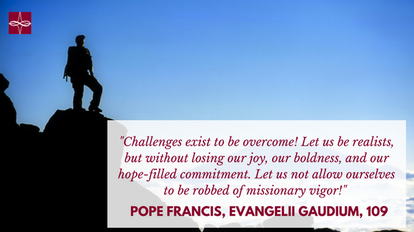
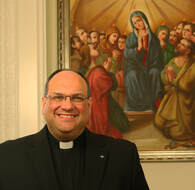
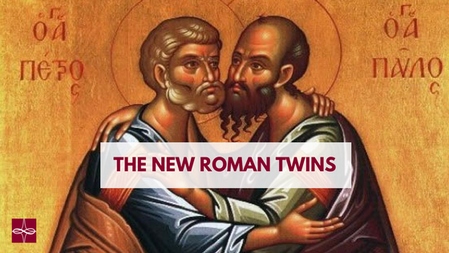

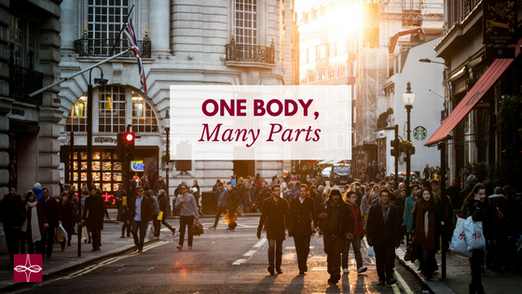

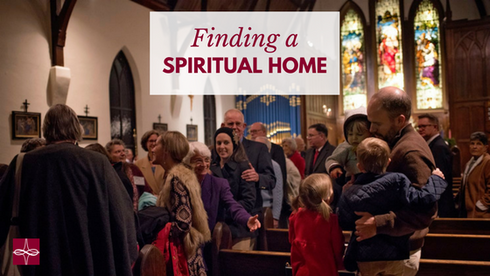

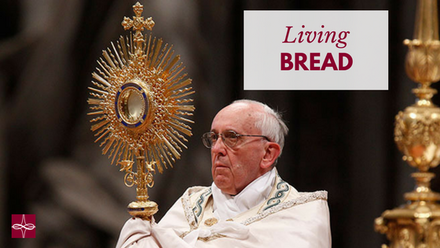

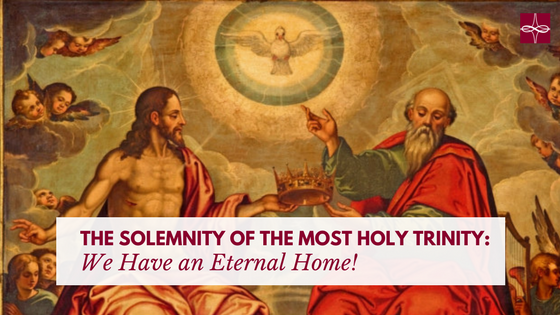

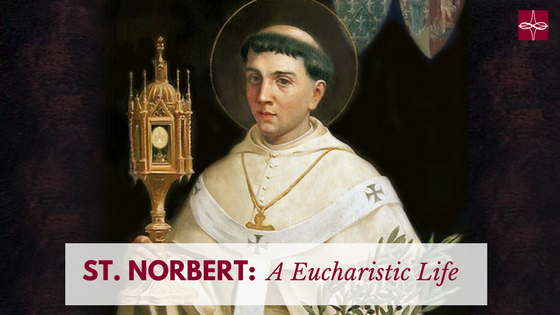

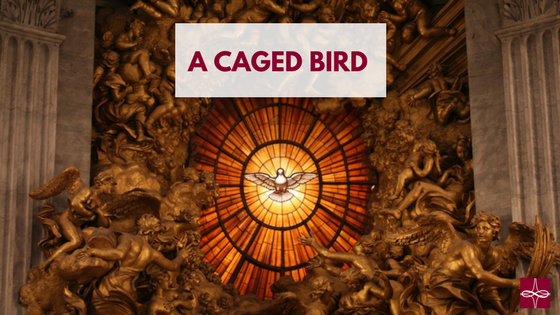

 RSS Feed
RSS Feed